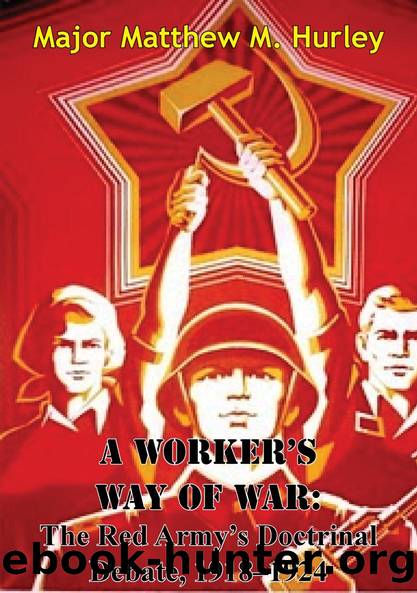A Worker's Way Of War: The Red Army's Doctrinal Debate, 1918â1924 by Major Matthew M. Hurley

Author:Major Matthew M. Hurley [Hurley, Major Matthew M.]
Language: eng
Format: epub
Tags: History, Military, United States, Europe, General, Germany, Russia & the Former Soviet Union
ISBN: 9781786250513
Google: b6xvCwAAQBAJ
Publisher: Pickle Partners Publishing
Published: 2015-11-06T05:07:21+00:00
CHAPTER 7 â THE SAD WINGS OF DESTINY: The Debateâs Final Stages and Aftermath
Judging from the bulk of literature available, it would seem that the debate over a âunifiedâ or âproletarianâ military doctrine virtually ended with the Eleventh Party Congress. True, the bitter, open conflict which characterized the debate in the military press and party congresses largely ceased after April 1922. However, some discussion of the subject continued, though primarily on a different and more obscure planeâi.e., among the hard-core theorists who genuinely took military matters to heart and cared little for the political conflagrations which engulfed and in many ways fueled the debate. Among these must be included Trotsky himself; and while he certainly had reason to fear the political ramifications of the debate, at the time he still remained oblivious to them.
That scant mention is made of the debateâs latter stages is due in part to the fact that the idea of a class-based method of warfare bore little relevance to the economic conditions which persistently plagued the Soviet leadership. Whether Trotskyâs opponents liked it or not, the manpower of the Red Army was being reduced to a peacetime strength of a mere 561,000 regular soldiers, supplemented by a âterritorial militiaâ system consisting of minimally trained, part-time troops.{240} Similarly, the technical, scientific, industrial, and transportation bases of the Soviet Union remained thoroughly primitive by Western standards and would require massive effort to be brought up to the level necessary to support large-scale, mobile, offensive operations with a fair chance of success. Discussions of a âproletarianâ doctrine simply paled in comparison to the irrefutable realities of the day and their attendant problems. Thus, Frunzeâs conception of a workersâ army unified by class consciousness and imbued with an offensive spirit, and Tukhachevskyâs dream of that armyâs gloriously marching forth to wars of revolution, would simply have to wait.
Furthermore, historians may be excused for their neglect of the final phases of the debate because it was quickly overshadowed by more profound events. The struggle for doctrinal pre-eminence was soon followed by a fight to control the military itself; from there a struggle for party and national leadership inevitably and quickly ensued. After Leninâs death the struggleâs military facade was dropped altogether, at least as far as Stalinâs ruling troika and Trotsky were concerned. The only âmilitaryâ aspect of the resultant contest was that Trotsky was relieved of his military duties before he was ousted from the party and ultimately thrown into exile.
In 1922, however, Trotsky seemed oblivious to the perils that awaited him. By all indications, he had won the doctrinal debate; his opponentsâ schemes had failed to gain approval at the Eleventh Party Congress, his position as War Commissar remained as yet unchallenged, andâperhaps most importantâLenin was still alive, and his sympathies and support, though muted, lay with Trotsky. As he later remarked from exile, âthe âproletarian military doctrineâ was rejected by the party like its older sister, âthe doctrine of proletarian culture{241}....[and] never saw a resurrection, notwithstanding that its former advocates soon stood at the helm of state.
Download
This site does not store any files on its server. We only index and link to content provided by other sites. Please contact the content providers to delete copyright contents if any and email us, we'll remove relevant links or contents immediately.
| Africa | Americas |
| Arctic & Antarctica | Asia |
| Australia & Oceania | Europe |
| Middle East | Russia |
| United States | World |
| Ancient Civilizations | Military |
| Historical Study & Educational Resources |
Red Famine: Stalin's War on Ukraine by Anne Applebaum(2470)
Chernobyl by Serhii Plokhy(2131)
Midnight in Chernobyl by Adam Higginbotham(2081)
The House of Government by Slezkine Yuri(1847)
Midnight in Chernobyl: The Untold Story of the World's Greatest Nuclear Disaster by Adam Higginbotham(1776)
Red Shambhala by Andrei Znamenski(1752)
The Gulag Archipelago (Vintage Classics) by Aleksandr Solzhenitsyn(1730)
From Cold War to Hot Peace by Michael McFaul(1714)
All the Kremlin's Men by Mikhail Zygar(1703)
Putin's Labyrinth(1662)
Red Notice by Bill Browder(1596)
The Future Is History by Masha Gessen(1594)
From Russia with Lunch by David Smiedt(1553)
A People's Tragedy by Orlando Figes(1545)
The Romanovs by Simon Sebag Montefiore(1494)
How to Tame a Fox (and Build a Dog): Visionary Scientists and a Siberian Tale of Jump-Started Evolution by Lee Alan Dugatkin & Lyudmila Trut(1469)
Putin's Labyrinth: Spies, Murder, and the Dark Heart of the New Russia(1457)
The Lost Spy by Andrew Meier(1399)
Art and Revolution by John Berger(1391)
